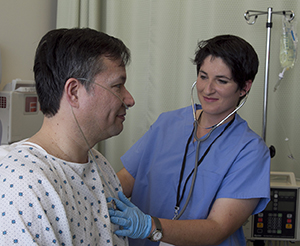Treating Pneumonia
Pneumonia is an infection of one or both of the lungs.
-
Pneumonia is caused by either a virus, fungus, or bacteria. Your treatment depends on the cause of your pneumonia.
-
Pneumonia can be very serious, especially in babies, young children, and older adults. It’s also serious for those with other long-term health problems or weakened immune systems.
-
Pneumonia is sometimes treated at home and sometimes in the hospital.
Antibiotic medicines
Antibiotics are needed for pneumonia caused by bacteria. They may be pills (oral medicines), shots (injections), or given by IV (intravenous) into a vein. If you are taking pills at home:
-
Fill your prescription and start taking your medicine as soon as you can.
-
You will likely start to feel better in a day or two. But don’t stop taking the antibiotic. Take your medicine as prescribed by your healthcare provider. If you stop too soon, your pneumonia may come back. Or the bacteria may become resistant to treatment in the future.
-
Use a pill organizer or set an alarm to help you remember to take your medicine.
-
Let your healthcare provider know if you have side effects.
-
Take your medicine exactly as directed on the label. Talk with your provider or pharmacist if you have any questions.
Antiviral medicines
Antiviral medicine may be prescribed for pneumonia caused by a virus. For example, antiviral medicine may be prescribed for pneumonia caused by the flu virus. Antibiotics don't work against viruses. If you are taking antiviral medicine at home:
-
Fill your prescription and start taking your medicine as soon as you can.
-
Talk with your provider or pharmacist about possible side effects. Let your healthcare provider know if you have side effects.
-
Take the medicine exactly as instructed. Talk with your provider or pharmacist if you have any questions.
-
Use a pill organizer or set an alarm to help you remember to take your medicine.
To relieve symptoms
There are many medicines that can help relieve symptoms of pneumonia. Some are prescription and some are over the counter.
Your healthcare provider may advise:
Check with your healthcare provider or pharmacist before taking any over-the-counter medicines such as cough and cold medicines. Some over-the-counter medicines should not be used if you have certain health conditions. Don't give aspirin to those under age 19. It can cause a serious illness called Reye syndrome.
Special treatments
If you are hospitalized for pneumonia, you may have other therapies, including:

Drink fluids and eat healthily
You should eat healthily to help your body fight the infection. Drinking a lot of fluids helps to replace fluids lost from fever and to loosen mucus in your chest.
-
Diet. Make healthy food choices. These include fruits and vegetables, lean meats and other proteins, 100% whole grain, and low-fat or no-fat dairy products.
-
Fluids. Drink at least 6 to 8 tall glasses a day. Water and 100% fruit or vegetable juice are best.
Get plenty of rest and sleep
You may be more tired than normal for a while. It's important to get enough sleep at night. It’s also important to rest during the day. Talk with your healthcare provider if coughing or other symptoms are interfering with your sleep.
Preventing the spread of germs
The best thing you can do to prevent spreading germs is to wash your hands often. You should:
-
Scrub your hands with soap and clean water for at least 20 seconds.
-
Clean in between your fingers, the backs of your hands, and around your nails.
-
Dry your hands on a separate towel or use paper towels.
You should also:
-
Keep alcohol-based hand cleaners with at least 60% alcohol nearby. Use it when soap and water aren't available.
-
Make sure you also clean surfaces that you touch. Use a product that kills all types of germs.
-
Stay away from others until you are feeling better.
-
Cover your nose and mouth when coughing or sneezing. Wash your hands afterwards.
Get vaccinated
Vaccines help protect you from getting pneumonia in the future. Ask your healthcare provider what vaccines are right for you and when you should get them. This may include the pneumococcal, flu, and COVID-19 vaccines.
When to call your healthcare provider
Call your healthcare provider if you have any of these:
-
Symptoms get worse or don't get better
-
New symptoms develop
-
Fever continues
-
Shortness of breath with normal daily activities
-
Side effects from your medicine
-
Increased mucus or mucus that is darker in color
-
Coughing gets worse
Call 911
Call 911 if any of these occur:
-
Chest pain
-
Lips or fingers are bluish, purple, or gray in color
-
Trouble breathing or wheezing
-
Shortness of breath that gets worse and doesn't improve with treatment
-
Feeling faint or dizzy
-
Loss of consciousness
-
Trouble talking or swallowing
-
Feeling of doom
Online Medical Reviewer:
Andrew D Schriber MD
Online Medical Reviewer:
Jessica Gotwals RN BSN MPH
Online Medical Reviewer:
Rita Sather RN
Date Last Reviewed:
12/1/2022
© 2000-2025 The StayWell Company, LLC. All rights reserved. This information is not intended as a substitute for professional medical care. Always follow your healthcare professional's instructions.